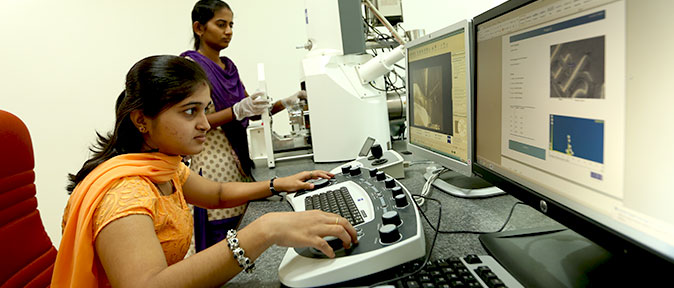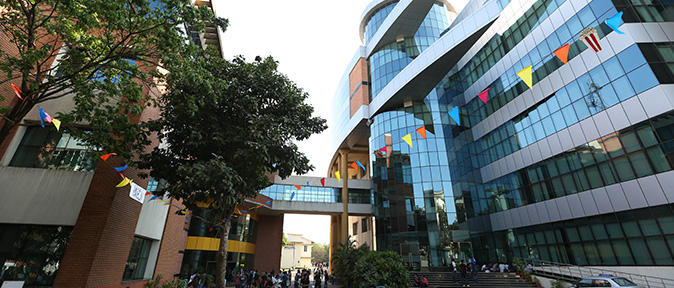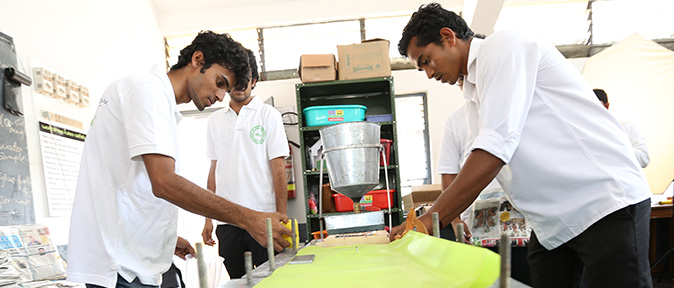M. Tech Chemical Engineering - Overview
Master of Technology in Chemical Engineering from MIT Manipal offers the following benefits.
- State-of-the-art classrooms, laboratory (advanced chemical engineering lab, advanced process control lab, process simulation lab (ASPEN and ASPEN HYSYS) and post graduate research laboratory in chemical engineering) and the central library facilities.
- As a part of curriculum, second year post graduate students pursue practice schools in research organizations like CSIR labs, DRDO, ISRO, Dr. Reddy's Laboratories.
- Regular seminars, workshops and guest lectures.
- Annual national symposium ‘Chemignite’ related to current trends in chemical engineering.
M. Tech Chemical Engineering - Career Opportunities
- Research and opportunities in technology industry as a process engineer, teaching, consultancy.
- Chemical process industry, research and development in private organizations and PSUs.
- The companies that recruit students from this program are Sravathi Advanced Process Technologies, TCS, IBM and Michelin.
PROGRAM OUTCOMES (PO)
In addition to PEOs, the B.Tech chemical engineering program established a set of Program Outcomes(POs), based on National Board of Accreditation Guidelines, and expected to be met by every graduating student from the program at the time of graduation.
PO 1. Engineering knowledge: Apply the knowledge of mathematics, science, engineering fundamentals, and an engineering specialization to the solution of complex engineering problems.
PO 2. Problem analysis: Identify, formulate, research literature, and analyze complex engineering problems reaching substantiated conclusions using first principles of mathematics, natural sciences, and engineering sciences.
PO 3. Design/Development of solutions: Design solutions for complex engineering problems and design system components or processes that meet the specified needs with appropriate consideration for the public health and safety, and the cultural, societal, and environmental considerations.
PO 4. Conduct investigations of complex problems: Use research-based knowledge and research methods including design of experiments, analysis and interpretation of data, and synthesis of the information to provide valid conclusions.
PO 5. Modern tool usage: Create, select, and apply appropriate techniques, resources, and modern engineering and IT tools including prediction and modeling to complex engineering activities with an understanding of the limitations.
PO 6. The engineer and society: Apply reasoning informed by the contextual knowledge to assess societal, health, safety, legal and cultural issues and the consequent responsibilities relevant to the professional engineering practice.
PO 7. Environment and sustainability: Understand the impact of the professional engineering solutions in societal and environmental contexts, and demonstrate the knowledge of, and need for sustainable development.
PO 8. Ethics: Apply ethical principles and commit to professional ethics and responsibilities and norms of the engineering practice.
PO 9. Individual and team work: Function effectively as an individual, and as a member or leader in diverse teams, and in multidisciplinary settings.
PO 10. Communication: Communicate effectively on complex engineering activities with the engineering community and with society at large, such as, being able to comprehend and write effective reports and design documentation, make effective presentations, and give and receive clear instructions.
PO 11. Project management and Finance: Demonstrate knowledge and understanding of the engineering and management principles and apply these to one’s own work, as a member and leader in a team, to manage projects and in multidisciplinary environments.
PO 12. Life-long learning: Recognize the need for, and have the preparation and ability to engage in independent and life-long learning in the broadest context of technological change.
Program Specific Outcomes of Chemical Engineering:
PSO-I – Apply the principles of unit operations and unit processes to design chemical process equipment.
PSO-II – Develop, Model, Simulate and optimize the chemical process systems.
PSO-III – Recommend sustainable solutions for environmental and energy engineering related challenges.
CORE COMPETENCIES
- Molecular Simulations
- Process Modeling and Simulation
- Fluid and Fluid-Solid Operations
- Drug Delivery Systems
- Catalysis and Nanotechnology
- Environmental Pollution Control
- Computational Fluid Dynamics
- Process Control
- Renewable Energy
- Advanced Materials
M. Tech in Chemical Engineering - Course Outline
Highlights of M.Tech. in Chemical Engineering new curriculum (2023) include following demanding subjects.
a) Artificial intelligence & Machine learning
b) Multiscale molecular simulations
c) Sustainable engineering
d) Green processes
(New Curriculum - 2023 Onwards) MTech Chemical course outline
(Old Curriculum) MTech Chemical course outline
Key Dates & Deadlines
15
Mar 15 26
Mar ' 26
Last date to Apply
'
Tentative Course Commencement Date
Indian Students Apply
Manipal Academy of Higher Education not only caters to one’s academic needs, but also lays emphasis on all-round development of its students.
International Students Apply
Manipal Academy of Higher Education not only caters to one’s academic needs, but also lays emphasis on all-round development of its students.
Indian Students Apply
Manipal Academy of Higher Education not only caters to one’s academic needs, but also lays emphasis on all-round development of its students.
International Students Apply
Manipal Academy of Higher Education not only caters to one’s academic needs, but also lays emphasis on all-round development of its students.
M. Tech in Chemical Engineering - Course Duration
2 years (4 semesters)
Facilties

Laboratories
World-class laboratories give learning a practical dimension

Innovation Centre
State-of-the-art Innovation Centre to facilitate multi-disciplinary research

Libraries
Libraries have excellent resources for reference and study

MUTBI
Paper tree - A green initiative by MIT students of MUTBI

Computing Facility
Wi-fi campus with modern computing and digital facilities






